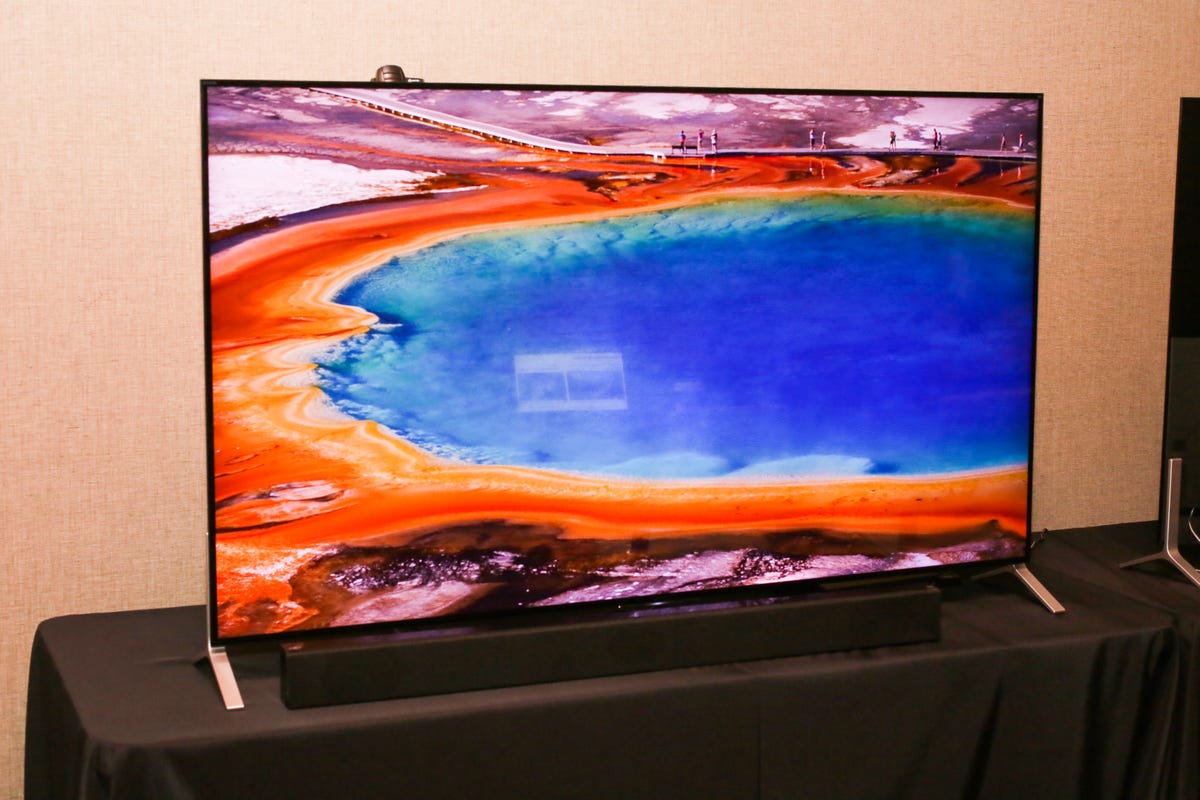
Sarah Tew/CNET
Addendum, June 21 at 9 a.m. ET: Sony has announced the X900C is now available for pre-sale and shipping from July 2015 while the X910C will be available later in Summer 2015 with both models now given official pricing.
We’ve known about Sony’s 4K-heavy 2015 lineup of TVs since CES in January, when the company announced their existence and posted detailed specifications on their features and differences.
In February when the prices leaked Sony neither confirmed no denied their accuracy, until now. A couple weeks before the first models start shipping, Sony has announced official pricing and put the TVs up for preorder on its site. It also gave CNET a hands-on peek at the new sets, complete with details on its HDR (high dynamic range) strategy.
Sony’s 2015 TVs go mostly 4K and Android (pictures)
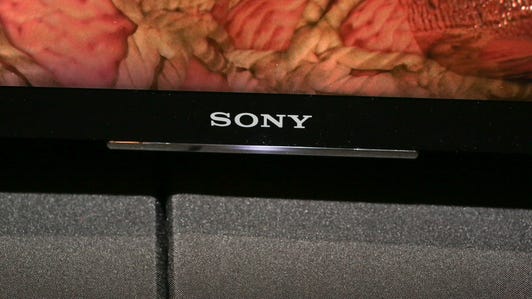

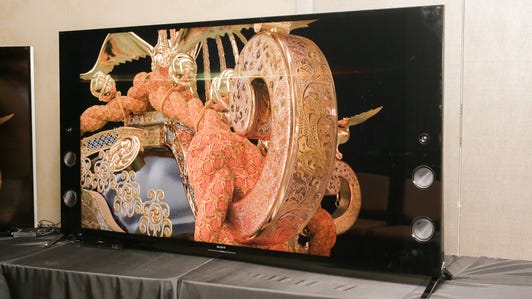

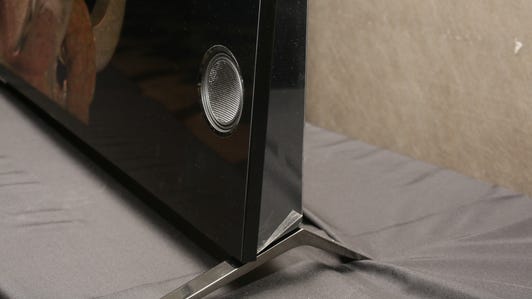

Of 14 new Sony TVs the company highlighted, 10 have 4K resolution and all support the Android TV operating system. They range from 43 to 75 inches but skew mostly very large, with eight models at 65 or 75 inches. And they’re not cheap.
Here’s the full lineup:
Sony 2015 TVs
| Model | Size | Resolution | Key feature | Available | Price |
|---|---|---|---|---|---|
| XBR-75X940C | 75-inch | 4K | Full-array local dimming | May | $7,999 |
| XBR-65X930C | 65-inch | 4K | Edge-lit local dimming | May | $4,499 |
| XBR-75X910C | 75-inch | 4K | Ultra-slim cabinet | Summer | $5,499 |
| XBR-65X900C | 65-inch | 4K | Ultra-slim cabinet | July | $3,999 |
| XBR-55X900C | 55-inch | 4K | Ultra-slim cabinet | July | $2,499 |
| XBR-75X850C | 75-inch | 4K | Triluminous color | May | $4,999 |
| XBR-65X850C | 65-inch | 4K | Triluminous color | May | $3,499 |
| XBR-55X850C | 55-inch | 4K | Triluminous color | May | $2,199 |
| XBR-49X830C | 49-inch | 4K | 4K resolution | May | $1,599 |
| XBR-43X830C | 43-inch | 4K | 4K resolution | May | $1,299 |
| KDL-75W850C | 75-inch | 1080p | Android TV | May | $2,999 |
| KDL-65W850C | 65-inch | 1080p | Android TV | May | $1,899 |
| KDL-55W800C | 55-inch | 1080p | Android TV | May | $1,299 |
| KDL-50W800C | 50-inch | 1080p | Android TV | May | $999 |
The sole model with local dimming from a full-array LED backlight (aka FALD), our favorite picture-enhancing technology for LCD TVs, is the XBR-75X940C. Sony also said the 2014 65-inch FALD XBR-65X950B would remain on sale throughout 2015, although it won’t receive the HDR upgrade (see below) due to hardware limitations.
The rest use edge-lit LED backlights, and among them only the 65-inch XBR-65X930C has local dimming. I expect it to perform very well given the excellent picture quality of the X900B , our favorite 4K LCD TV of 2014. And love ’em or hate ’em, both the X940C and X930C have those massive built-in speakers.


Sarah Tew/CNET
Below those two in price is the X900C , billed as the world’s thinnest LCD TV. Parts of the TV’s cabinet, namely the top half of the set, measure just 0.2 inch thick (below). For comparison’s sake, LG’s 55-inch OLED TV, model 55EC9300 , has a depth of 0.25 inch across most of its body. So the X900C is even thinner. The 75-inch X910C is a bit thicker, which is probably a good thing for a TV that big.
All three include a custom flush wall mount in the box that ensures as flush an installation as possible–all you need to supply are wall anchors. When I asked whether the seemingly stud-unfriendly spacing of the wall plate was an issue, Sony’s rep assured me that finding wall studs wouldn’t be necessary given the light weight of the TVs.
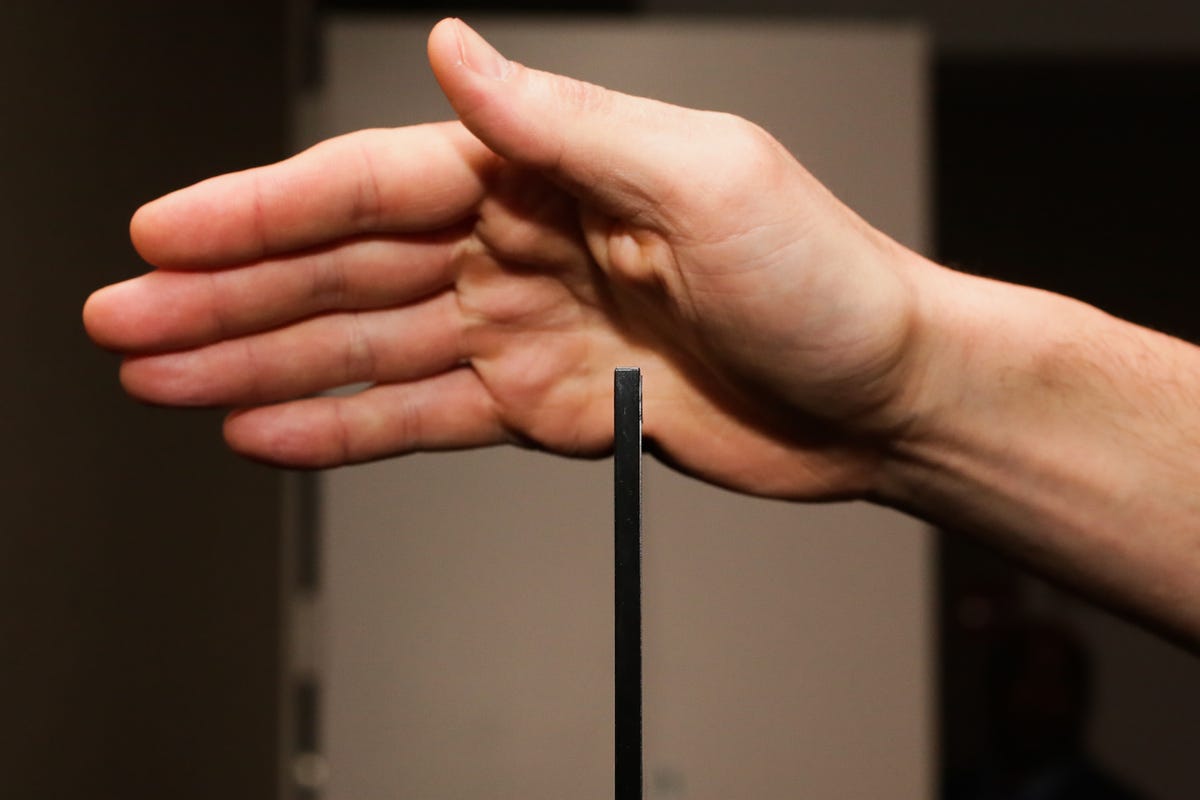

Sarah Tew/CNET
All of the models from the X850C and up feature Triluminous color, a nanocrystal technology similar to that touted by Samsung and LG. Sony wouldn’t cite an exact specification when I asked what percentage of the P3 color space it covered, but did tell me it could equal the coverage of Samsung’s SUHD technology.
New for this year is the 4K X1 processor found on all of its 2015 4K models. Sony says it has completely redesigned the special sauce powering its processing, improving many aspects of picture quality and upscaling.
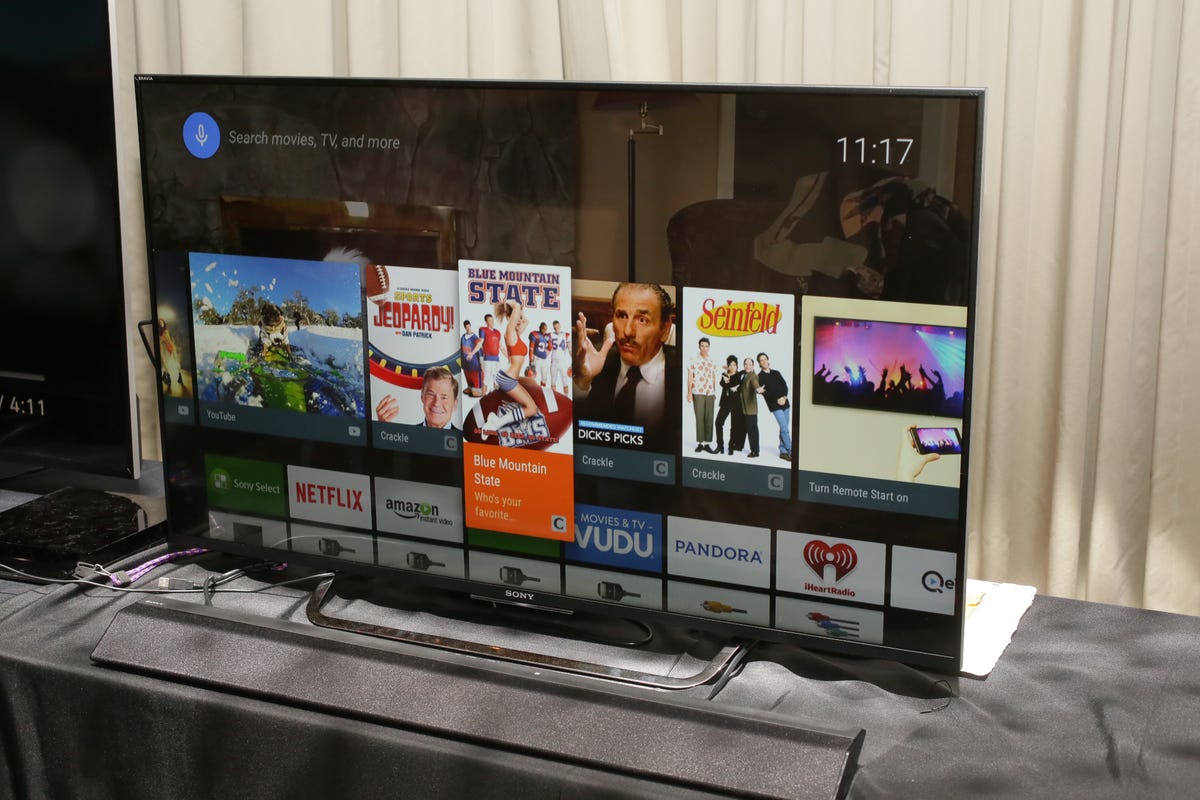

Sarah Tew/CNET
None of Sony’s TVs are curved, and rather than tout a fancy homegrown Smart TV system like Web OS 2.0 or Tizen, Sony elected to go with Google’s Android TV this year to power its smart sets. The interface looks exactly like that of the Google Nexus Player, but with a line for input selection and deeper TV-specific settings menus.
Sony’s announcement mentions numerous apps that aren’t yet available on the Nexus Player, such as Amazon Instant Video and PBS, so it will be interesting to see if appear by the time the TVs launch. Since Android TV devices, including Sony’s new TVs, also work with Google’s Cast technology, the app selection will be relatively robust in any case.
And like last year’s Sony TVs ( and 2015 Samsungs), all can work with PlayStation Now to play PS3 games without a console.
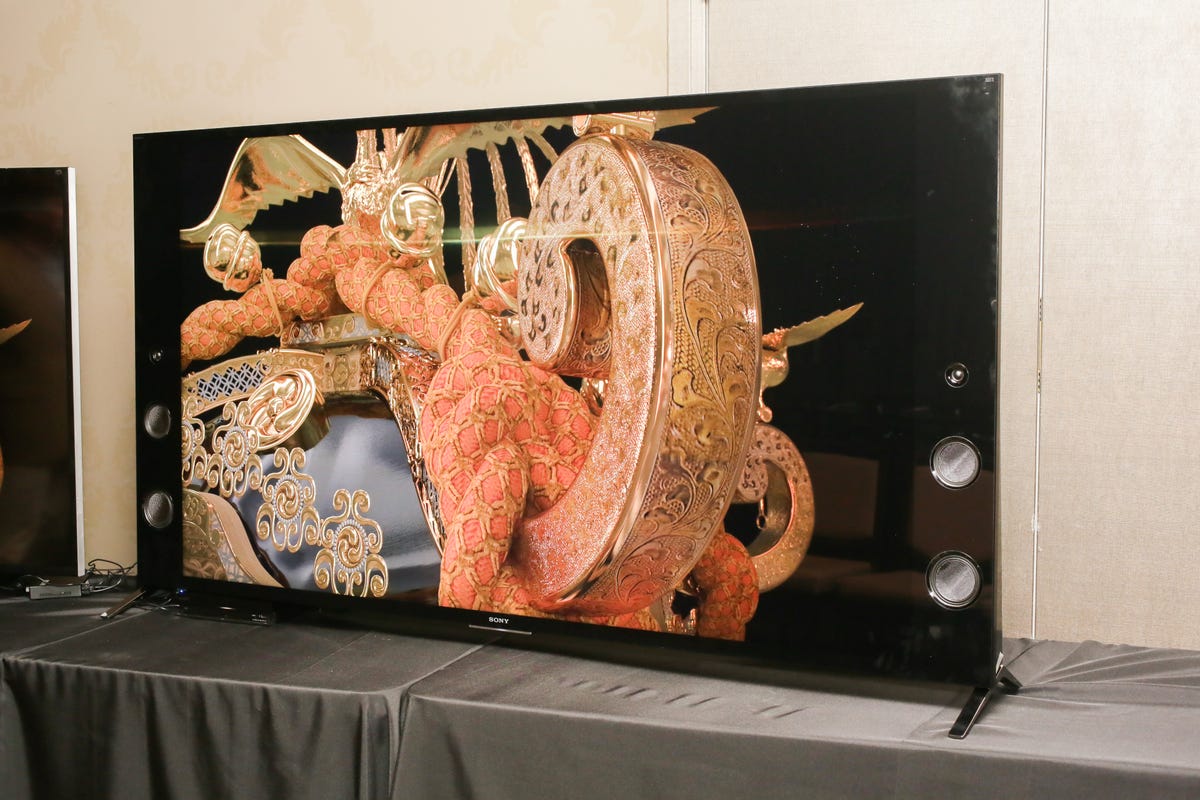

Sarah Tew/CNET
Demo impressions and HDR sessions
I got a chance to see demos of Sony’s new TVs and play around with Android TV, and the results were mostly impressive. The new operating system behaved just like the Nexus Player: responsive, easy to navigate and filled to the brim with Google content. I’m hoping it evolves to better surface content you use every day, like Netflix, but I’m not holding my breath.
Sony’s reps spent a lot of time in a side-by-side comparison touting the performance of their sets’ Standard (default) picture settings compared to those of competitors. That’s laudable as far as it went, but in my experience the default picture settings don’t usually result in peak performance, so they’re less interesting to me.
More intriguing was a very informative presentation on Sony’s HDR implementation, courtesy of Toshi Ogura of Sony’s TV Platform Division. He went into the benefits of HDR and the numerous competing methods and nascent formats, including Dolby Vision and its “single-layer” alternatives espoused by Sony and others.
The gist was that two of Sony’s TVs, the XBR-75X940C and XBR-65X930C, will be HDR-capable. They’ll work compatible with upcoming HDR material (via a summer software update), including so-equipped 4K Blu-rays once they hit the market, and Netflix and Amazon HDR streams, both coming later this year. They won’t be compatible with full-fledged Dolby Vision material, but then again neither will any 2015 TV announced so far — unless you count the Vizio Reference series, which doesn’t have an official price, nor a shipping date yet aside from “sometime in 2015.”
Ogura showed a demo with two 4K Sony TVs, one a non-HDR model showing content mastered with standard dynamic range and color, next to a XBR-75X940C showing the same content mastered in HDR with wide-gamut color. Unsurprisingly, the HDR content looked better, with punchier highlights, more realistic blacks and improved color. The standard dynamic range material appeared flat by comparison.
We look forward to reviewing Sony’s new TVs soon.




